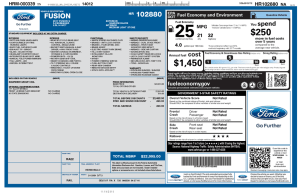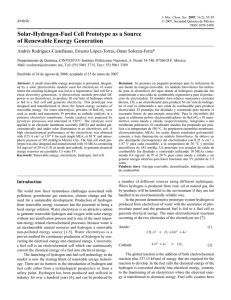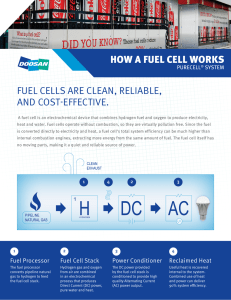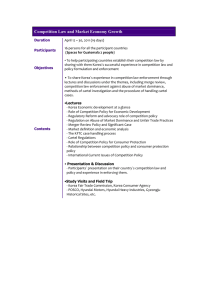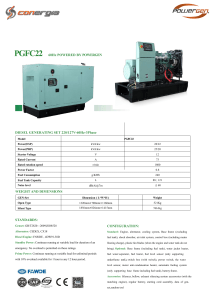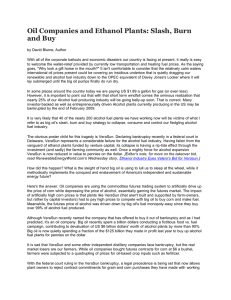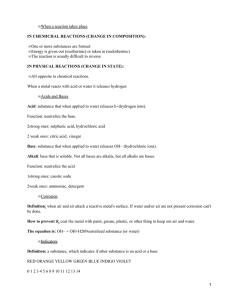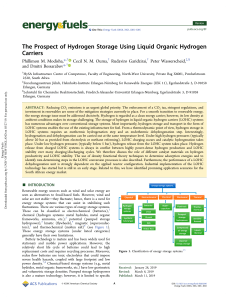19 hyundai-construction-equipment-plans-fuel-cell-powered-excavator-2020
Anuncio
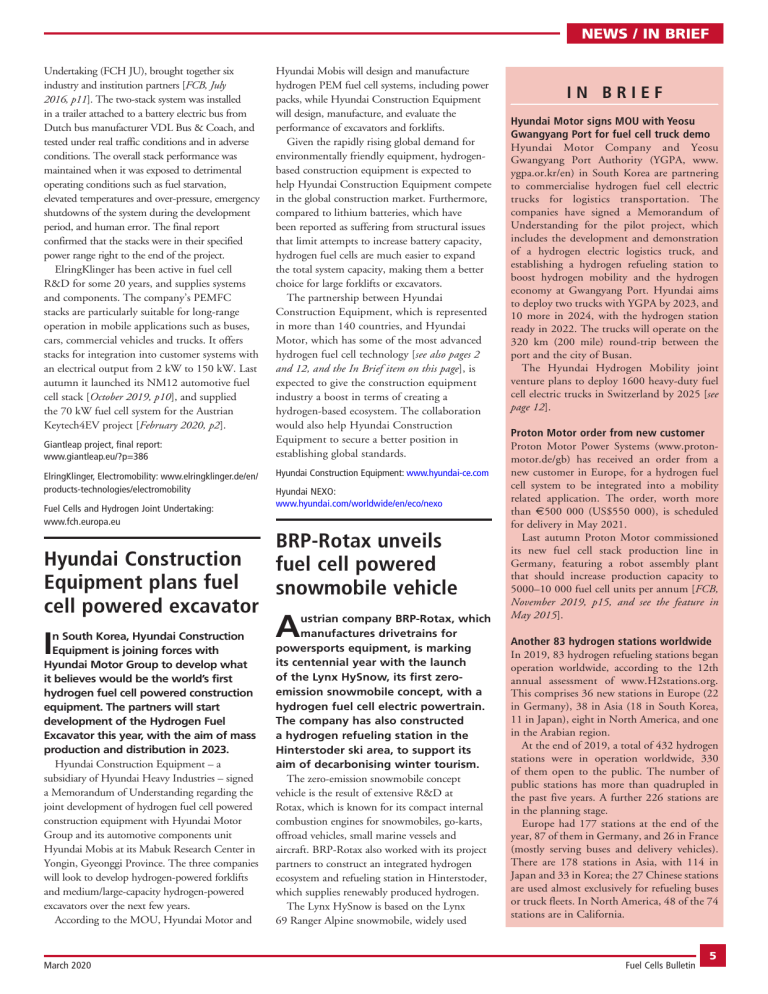
NEWS / IN BRIEF Undertaking (FCH JU), brought together six industry and institution partners [FCB, July 2016, p11]. The two-stack system was installed in a trailer attached to a battery electric bus from Dutch bus manufacturer VDL Bus & Coach, and tested under real traffic conditions and in adverse conditions. The overall stack performance was maintained when it was exposed to detrimental operating conditions such as fuel starvation, elevated temperatures and over-pressure, emergency shutdowns of the system during the development period, and human error. The final report confirmed that the stacks were in their specified power range right to the end of the project. ElringKlinger has been active in fuel cell R&D for some 20 years, and supplies systems and components. The company’s PEMFC stacks are particularly suitable for long-range operation in mobile applications such as buses, cars, commercial vehicles and trucks. It offers stacks for integration into customer systems with an electrical output from 2 kW to 150 kW. Last autumn it launched its NM12 automotive fuel cell stack [October 2019, p10], and supplied the 70 kW fuel cell system for the Austrian Keytech4EV project [February 2020, p2]. Giantleap project, final report: www.giantleap.eu/?p=386 ElringKlinger, Electromobility: www.elringklinger.de/en/ products-technologies/electromobility Fuel Cells and Hydrogen Joint Undertaking: www.fch.europa.eu Hyundai Construction Equipment plans fuel cell powered excavator I n South Korea, Hyundai Construction Equipment is joining forces with Hyundai Motor Group to develop what it believes would be the world’s first hydrogen fuel cell powered construction equipment. The partners will start development of the Hydrogen Fuel Excavator this year, with the aim of mass production and distribution in 2023. Hyundai Construction Equipment – a subsidiary of Hyundai Heavy Industries – signed a Memorandum of Understanding regarding the joint development of hydrogen fuel cell powered construction equipment with Hyundai Motor Group and its automotive components unit Hyundai Mobis at its Mabuk Research Center in Yongin, Gyeonggi Province. The three companies will look to develop hydrogen-powered forklifts and medium/large-capacity hydrogen-powered excavators over the next few years. According to the MOU, Hyundai Motor and March 2020 Hyundai Mobis will design and manufacture hydrogen PEM fuel cell systems, including power packs, while Hyundai Construction Equipment will design, manufacture, and evaluate the performance of excavators and forklifts. Given the rapidly rising global demand for environmentally friendly equipment, hydrogenbased construction equipment is expected to help Hyundai Construction Equipment compete in the global construction market. Furthermore, compared to lithium batteries, which have been reported as suffering from structural issues that limit attempts to increase battery capacity, hydrogen fuel cells are much easier to expand the total system capacity, making them a better choice for large forklifts or excavators. The partnership between Hyundai Construction Equipment, which is represented in more than 140 countries, and Hyundai Motor, which has some of the most advanced hydrogen fuel cell technology [see also pages 2 and 12, and the In Brief item on this page], is expected to give the construction equipment industry a boost in terms of creating a hydrogen-based ecosystem. The collaboration would also help Hyundai Construction Equipment to secure a better position in establishing global standards. Hyundai Construction Equipment: www.hyundai-ce.com Hyundai NEXO: www.hyundai.com/worldwide/en/eco/nexo BRP-Rotax unveils fuel cell powered snowmobile vehicle A ustrian company BRP-Rotax, which manufactures drivetrains for powersports equipment, is marking its centennial year with the launch of the Lynx HySnow, its first zeroemission snowmobile concept, with a hydrogen fuel cell electric powertrain. The company has also constructed a hydrogen refueling station in the Hinterstoder ski area, to support its aim of decarbonising winter tourism. The zero-emission snowmobile concept vehicle is the result of extensive R&D at Rotax, which is known for its compact internal combustion engines for snowmobiles, go-karts, offroad vehicles, small marine vessels and aircraft. BRP-Rotax also worked with its project partners to construct an integrated hydrogen ecosystem and refueling station in Hinterstoder, which supplies renewably produced hydrogen. The Lynx HySnow is based on the Lynx 69 Ranger Alpine snowmobile, widely used IN BRIEF Hyundai Motor signs MOU with Yeosu Gwangyang Port for fuel cell truck demo Hyundai Motor Company and Yeosu Gwangyang Port Authority (YGPA, www. ygpa.or.kr/en) in South Korea are partnering to commercialise hydrogen fuel cell electric trucks for logistics transportation. The companies have signed a Memorandum of Understanding for the pilot project, which includes the development and demonstration of a hydrogen electric logistics truck, and establishing a hydrogen refueling station to boost hydrogen mobility and the hydrogen economy at Gwangyang Port. Hyundai aims to deploy two trucks with YGPA by 2023, and 10 more in 2024, with the hydrogen station ready in 2022. The trucks will operate on the 320 km (200 mile) round-trip between the port and the city of Busan. The Hyundai Hydrogen Mobility joint venture plans to deploy 1600 heavy-duty fuel cell electric trucks in Switzerland by 2025 [see page 12]. Proton Motor order from new customer Proton Motor Power Systems (www.protonmotor.de/gb) has received an order from a new customer in Europe, for a hydrogen fuel cell system to be integrated into a mobility related application. The order, worth more than E500 000 (US$550 000), is scheduled for delivery in May 2021. Last autumn Proton Motor commissioned its new fuel cell stack production line in Germany, featuring a robot assembly plant that should increase production capacity to 5000–10 000 fuel cell units per annum [FCB, November 2019, p15, and see the feature in May 2015]. Another 83 hydrogen stations worldwide In 2019, 83 hydrogen refueling stations began operation worldwide, according to the 12th annual assessment of www.H2stations.org. This comprises 36 new stations in Europe (22 in Germany), 38 in Asia (18 in South Korea, 11 in Japan), eight in North America, and one in the Arabian region. At the end of 2019, a total of 432 hydrogen stations were in operation worldwide, 330 of them open to the public. The number of public stations has more than quadrupled in the past five years. A further 226 stations are in the planning stage. Europe had 177 stations at the end of the year, 87 of them in Germany, and 26 in France (mostly serving buses and delivery vehicles). There are 178 stations in Asia, with 114 in Japan and 33 in Korea; the 27 Chinese stations are used almost exclusively for refueling buses or truck fleets. In North America, 48 of the 74 stations are in California. Fuel Cells Bulletin 5
